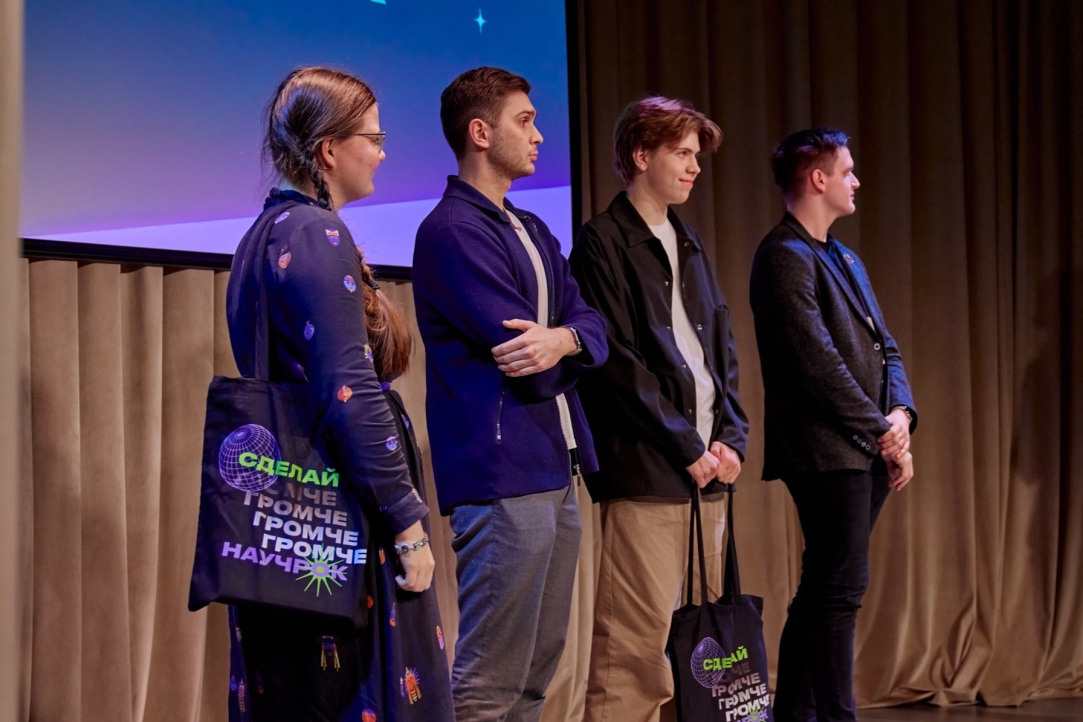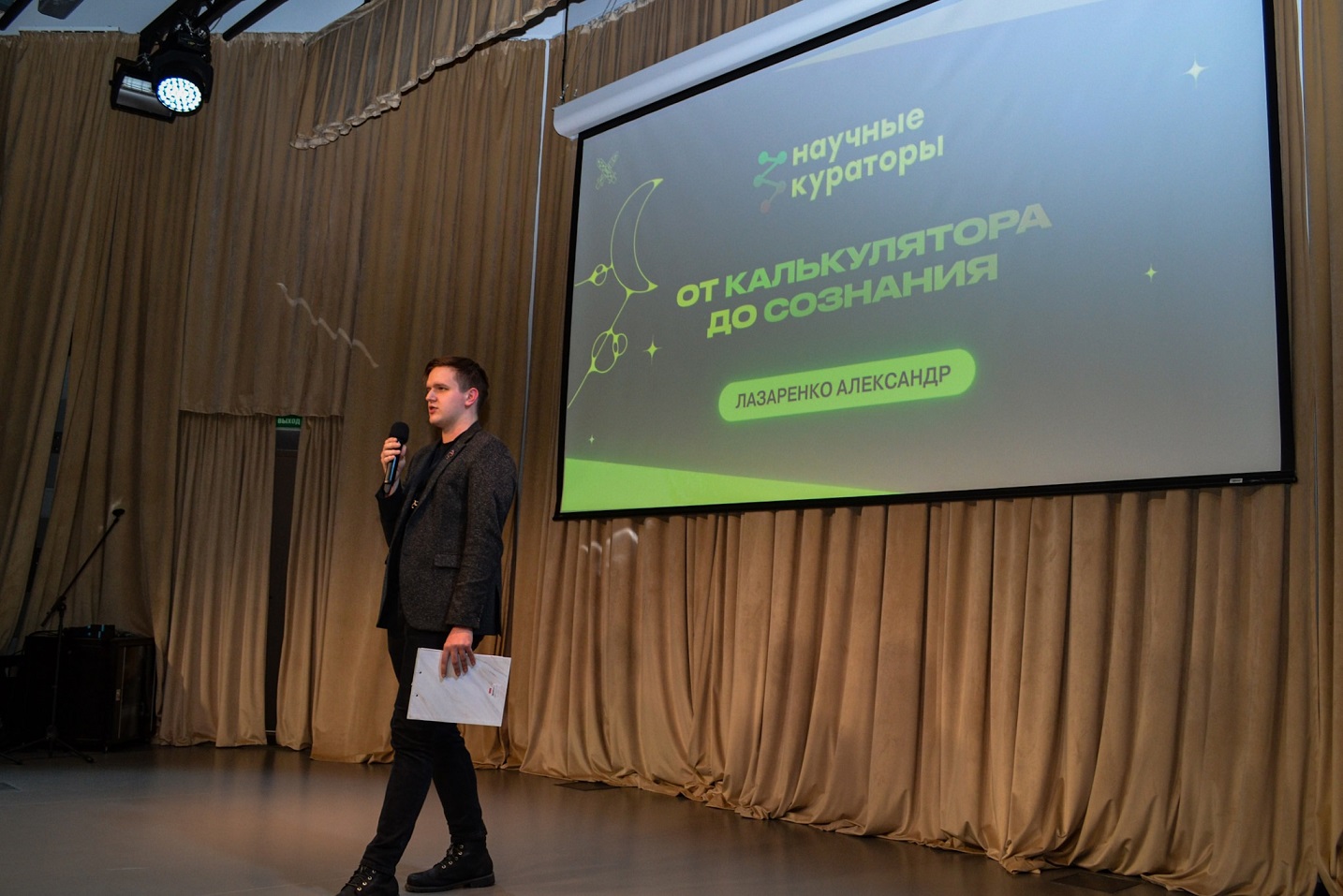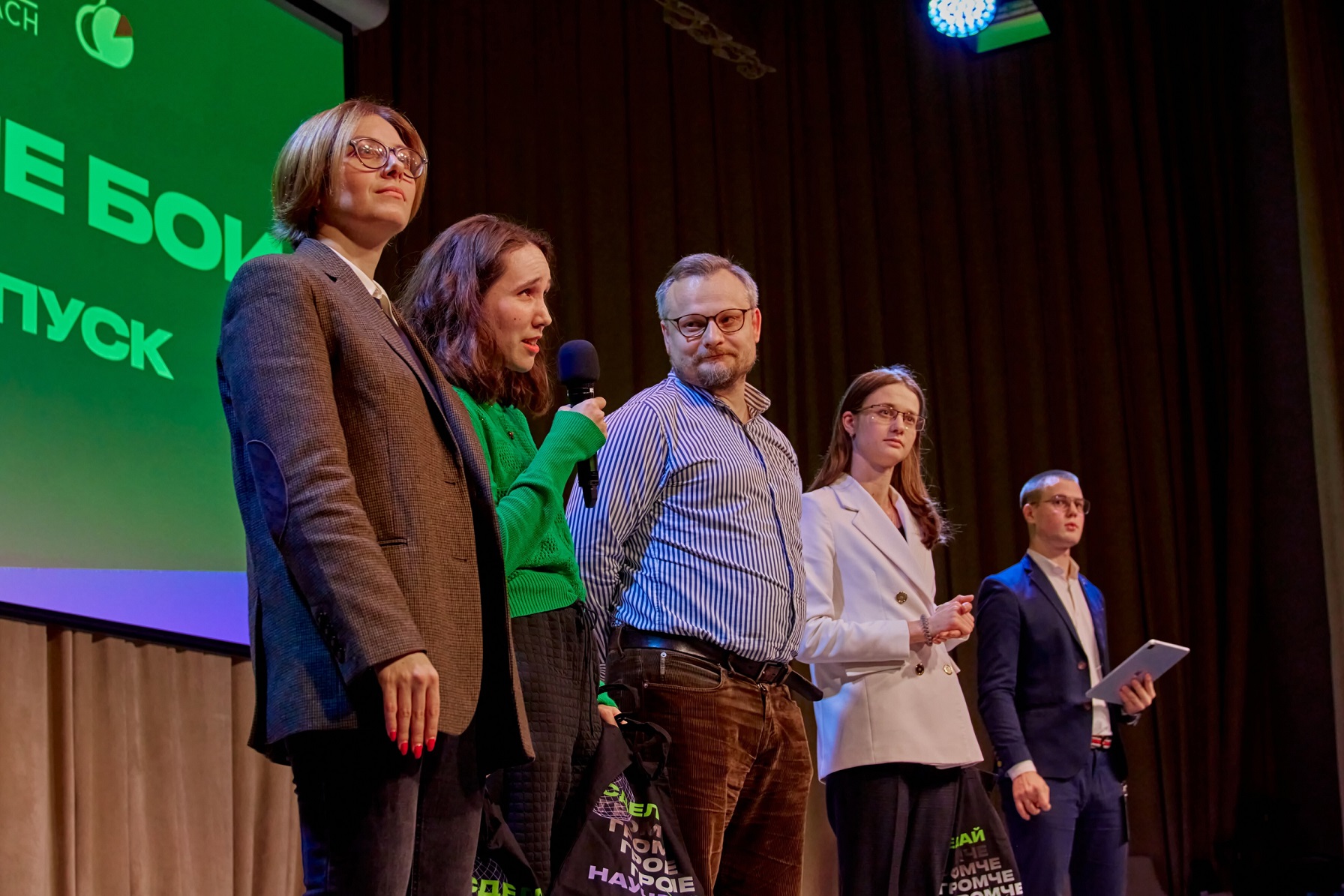Pokémon, ARPANET, and the Mysterious East: Science Battles between Student Organisations at HSE

A special session of HSE Science Battles has taken place at the HSE Cultural Centre. This time, the speakers represented their student organisations and scientific fields. The evening brought together ideas about the future—from metaverses and deciphering ancient languages to neuromodular chips and the prospects of social sciences.
The special session of HSE Science Battles, dedicated to future transformations in professional and scientific spheres, was held in the Small Hall of the HSE Cultural Centre during STUDENT NIGHT 2025.
Representatives of four student organisations took part in the event.
The 20 Percent educational media platform provides straightforward answers to complex questions about state bureaucracy and economic phenomena such as crises and inflation, and also produces podcasts and digests of economic news.
The activities of the Dialogues on the East media project range from podcasts and meetings with renowned specialists in Asian studies to in-house analysis, book and photo collections, and original memes.
The HSE Science Curators association of scientists and activists of the Faculty of Computer Science promotes computer science, organises inspiring events, and supports students in their academic careers.
The Alliance of Social Sciences is an international conference for students and early-career researchers which focuses on digital humanities and interdisciplinary studies.
The traditional rules of HSE Science Battles remain unchanged: no presentations—just the charisma, props, and charm of the speakers.
HSE Science Battles is an intellectual competition held in a science-based TED Talks format. Student researchers get a chance to present their scientific work to the public in just 10 minutes. The event format forbids the use of presentations—competitors can only win over the audience and jury through their personal performance and the use of props. Each semi-final traditionally features four research presentations. The jury’s scores are combined with the audience’s votes, and a leader is announced. Four semi-finals are held throughout the year, with the winners facing off in the final battle. The most successful researchers receive prizes, and the season champion is awarded an academic travel grant. The project continues to expand and experiment with new formats—from teacher battles to inter-campus competitions.
The Metaverse Has Taken Over the World: ‘Do You See Any Pokémon? They Are There!’
The first to take the stage was Nikita Topkov, founder of the 20 Percent media platform and student of the master’s in Sociology of Public Sphere and Digital Analytics. His talk focused on the metaverse.
Nikita began his presentation with an interactive exercise: he invited the audience to close their eyes and imagine three futuristic scenarios. The first depicted a grim picture of social inequality, where the virtual world became a refuge for those unable to achieve a decent life in reality. The second was a dystopia where artificial intelligence enslaved humanity using illusory virtual reality. The third scenario presented virtual reality as a perfect world, enticing the entire population to abandon the physical world in chaos. These rather bleak scenes were borrowed from popular films: Ready Player One (2018, Steven Spielberg), The Matrix (1999, Lana and Lilly Wachowski), and Surrogates (2009, Jonathan Mostow). Nikita used these scenarios to illustrate how pop culture envisioned our transition to digital reality.
He discussed the current state of the metaverse and explained the difference between virtual reality (VR) and augmented reality (AR). To illustrate AR, he referenced the globally popular game Pokémon Go, inviting the audience to look around: ‘Does anyone see any Pokémon here? They are there!’

Nikita identified three key trends in the development of the metaverse: the creation of more affordable technology, the penetration of digital dimensions into various spheres of life (from surgical VR simulators at Sechenov University to a digital replica of HSE’s Pokrovka campus in Minecraft), and the growing need to regulate both the economic and ethical aspects of virtual spaces.
During the traditional Q&A session, one audience member asked about digital fraud and the possibility of creating a ‘digital police force.’ Nikita explained the complexity of such control due to the decentralised nature of the metaverse.
Responding to a question about the impact of geopolitical situations on the development of the metaverse in Russia, Nikita Topkov noted that the industry is still so young that it does not require import substitution. He spoke about Russian brands actively promoting themselves on open collaborative platforms like Roblox and Spatial, giving the examples of Burger King, Magnit, and Auchan.
Nikita Topkov concluded his speech by urging active participation in building the future of the metaverse to avoid the dystopian scenarios described earlier.
‘I cannot wait until we can hold the next HSE Science Battles in the metaverse!’ the speaker enthusiastically remarked.
AI Will Uncover the Secrets of the Indus Valley: A New Era of Asian Studies
Next on stage was Katya Kozlova, founder of the Dialogues on the East media project, who spoke about the current state and future of Asian studies. Her assistant, Kira, dressed in a kimono and holding a traditional Chinese fan, gradually unfolded the fan with each new point, revealing elegant Eastern landscapes to the audience. Asian studies have not escaped the influence of digitalisation: today’s students learn Python and data analytics, while researchers actively use SPSS, R, and SQL for data work. Katya and her colleagues even created a Telegram bot called ‘Digital Confucius,’ which shares Eastern wisdom daily with its followers.
The speaker highlighted the increasing interdisciplinarity of Asian studies. In her research on political preferences among the youth in Central Asian countries, she combines methods from sociology to address questions traditionally linked to Asian studies.

Moving on to the future of her field, Katya, who has a degree in Sinology, jokingly referenced ancient Chinese divination practices and invited the audience to trust her intuition. She predicted the growing role of fast and powerful artificial intelligence in Asian studies, particularly in translating ancient texts and deciphering previously mysterious languages like Elamite or the Harappan script of the Indus Valley (the Indus river originates in the Himalayas and flows through modern-day India and Pakistan).
She also touched on the shift in the Asian power balance from China to India and urged her fellow specialists in Asian studies not to lose their linguistic expertise, especially in rare languages: ‘Russia has an enormous legacy of studying countries and languages that many have never even heard of. It is a shame when graduates with such linguistic skills leave academia for other fields, leaving us without such specialists. A country’s foreign policy is stronger when it has experts on different small regions. So, colleagues, when you are making important decisions for business or government, remember that Asia is not just China or Japan.’
‘The light comes from the East, and though it can be cunning and cruel, the East is beautiful. Give it a chance, and I am sure you will succeed!’ concluded Katya Kozlova confidently.
Multifaceted Sociology: On the Verge of Interdisciplinarity
Dmitry Zlobin, second-year undergraduate student in Sociology and organiser of the annual Alliance of Social Sciences conference, set out to demonstrate the diversity of social sciences. He presented three studies from the latest conference, each seemingly unrelated to the others.
The first study, conducted by master's student Alexandra Bogdanovska, focused on personology—a field aimed at understanding the laws governing human personality and why people are who they are. It considers a wide range of factors, showing that even something as small as the habit of smiling can reveal a lot about a person. Alexandra’s research explores the controversies surrounding this comprehensive methodology. However, one thing is clear: personology helps people better understand each other and find common ground.
The second study belongs to the realm of social anthropology. Anna Bukharova, a student at HSE University-St Petersburg, explored the experiences of female film critics who often face bias due to the stereotype that men are superior at analytical thinking and critical evaluation.
The third work tackled the relatively new concept of ‘post-truth.’ Conference participant Diana Valisheva investigated the phenomenon where the emotional aspect of news is more significant to people than facts. In today’s world, verifying the accuracy of information is challenging, and very few are willing to fact-check, a tendency cleverly exploited by marketers.

Dmitry Zlobin is confident that even with the rapid development of IT and artificial intelligence, social sciences will not only retain their importance but also grow stronger. Qualitative data obtained by sociologists is extremely difficult to translate into computer-readable formats, protecting the field from total digitalisation. Meanwhile, new methods of processing and analysing quantitative data will open up previously inaccessible horizons for sociology.
Concluding his speech, Dmitry emphasised that social sciences are not distant abstractions but are present everywhere around us. He also highlighted that the Alliance of Social Sciences conference is an excellent starting point for exploring this field.
History of Computer Technology: Stone, Toaster, Neural Module
Second-year Software Engineering undergraduate student Alexander Lazarenko, scientific curator of the Faculty of Computer Science, delivered a talk on the history of computer technology, spanning from the first inventions of the 17th century to modern neural networks.
‘What did computer technology begin with?’ Alexander asked, dramatically pulling a flat white stone from his jacket pocket. ‘With this stone.’ He then traced the evolution through Pascal’s and Leibniz’s mechanical calculators, mechanical counting machines with punch cards and gears, leading to the major leap in the 20th century when two world wars demanded unprecedented computational power. This period saw the invention of the first electronic computers, which occupied several rooms. In the second half of the century, microchips and transistors made computers more accessible.

The invention of the internet emerged from the military communication network ARPANET, initially connecting American universities before linking the entire world. However, not everything went smoothly; excitement over new technologies led to the dot-com bubble, which burst in 2001. Alexander Lazarenko noted that this crisis resulted in a more cautious approach to future innovations.
This brings us to the present day, where powerful computers—by past standards—fit in our pockets or even on our wrists. A striking example of the deep integration of technology into our lives is the 1993 game Doom, which can run smoothly not only on personal computers but also on smart fridges, toasters, and even digital pregnancy tests. Recommendation systems, image and text generation are now part of our daily lives. Alexander highlighted that neural networks simplify monotonous tasks, leaving more room for human creativity.
Alexander considers neural modular chips, which enable computer control through thought, to be the most futuristic technology in existence today. Naturally, such technologies raise numerous ethical questions. How can artificial intelligence be made more ethical? How can it be safeguarded against potential malfunctions? How can we protect ourselves from negative manifestations of artificial intelligence? All these questions are yet to be answered. Scientific curators from the Faculty of Computer Science, who are always ready to help navigate the flood of new and unknown developments, will play a crucial role in finding these answers.
Following the voting, Nikita Topkov took first place in the special session of HSE Science Battles with his talk on the metaverse. After the winners were awarded, Alexander Lazarenko was asked about the future of his prop stone—the precursor to computer technology. He promised to give it to the audience member who asked the best question after the event.

The special session of HSE Science Battles was evaluated by an impartial panel of judges, including:
Oxana Mikhaylova, Senior Lecturer of the Department for Social Institutions Analysis at the HSE Faculty of Social Sciences
Maria Efimenko, Lecturer of the School of Asian Studies at the HSE Faculty of World Economy and International Affairs
Dmitry Balashov, Senior Lecturer of the School of Theory of Law and Comparative Law at the HSE Faculty of Law
Maria Gordenko, Academic Supervisor of the Master’s Programme ‘Data Analysis in Development’
Text by Egor Potseluyko and Ekaterina Peshakova, Research Assistants at the HSE Project and Educational Laboratory of Economic Journalism
See also:
Science of Winning: Republic of Scientists Festival Held at HSE University
On November 8, HSE University hosted the Republic of Scientists Festival for the seventh time. The event aims to remind students that science is multifaceted and universal, to showcase areas of knowledge beyond their educational curriculum, and to connect early-career scientists with one another. Guests of the festival enjoyed interactive activities, popular science lectures by university faculty and alumni, and the grand finale of Season VII of Science Battles.
From Ingenious Fungi to Post-feminism: HSE University Hosts Season’s Last Science Battles Semi-Final
Season VI of Science Battles at HSE University is entering the homestretch. The June semi-final determined the list of finalists and helped many viewers choose their favourites. This time, young researchers decided to figure out how to conduct a police lineup without destroying a person’s life, as well as how to improve a child’s academic performance without instilling neurotic perfectionism. They also found out that fungi and mould help heal scars and save the environment, and that adherents of post-feminism have very mixed feelings about their own images on TikTok.
From Cultural Appropriation to Prison Jargon: Second Semi-Final of Science Battles Takes Place at HSE University
On March 19, the second semi-final of the fourth season of HSE University Science Battles brought together the topics of cultural appropriation, pharmacological neural networks, prison jargon, and ‘diseases’ of higher education on the same stage. Students from various degree programmes presented their projects in the Community space. Read on to find out more about the performances featured in the semi-finals.
From Hate-Watching to GMOs: Highlights of the HSE Science Battles’ Third Semi-Finals
The fifth season of HSE Science Battles is currently underway, with the Sber office serving as a venue for another stage of the battle. Four speakers fought for a place in the finals by presenting their research in a ‘TED Talks’ format. The HSE News Service reports on highlights from the event, including how to explain to your grandmother that GMOs aren’t dangerous, what font you should use to develop your memory, and who ‘hate-watchers’ are.
Robot Rights and Talking Babies: Discussions at HSE Science Battles
Four young scientists competed in the second semi-final of the fifth season of HSE University Science Battles, which was held at HSE Cultural Centre. What tasks lead students to cheat on exams, how babies learn to talk, whether artificial intelligence is subject to copyright, how to deal with false modesty — each researcher presented their work while the audience and the jury chose a winner to compete for the main prize of the season — an academic travel grant.
‘It Was Interesting to Showcase a Unique Student Project’
Held as part of the Second New Knowledge Marathon, the fourth HSE Science Battles attracted a wide audience. HSE Students Frol Sapronov, Marina Kasyulina, and Vsevolod Nikolsky took part in the competition’s new televised format to demonstrate how to talk about science vividly and in simple terms understandable to any audience.
HSE Science Battles Wrap Up Third Season
What professions in Russia are considered ‘dirty’? Do computers have empathy? What happens when the brain incorrectly predicts how we feel? The answers to these and other questions were tackled at the final round of the HSE Science Battles, which was held online for the first time this year. Read on to find out which performance was rated highest by the audience and jury and why the Science Battles are a must-see for everyone.


